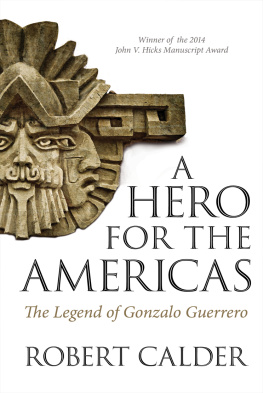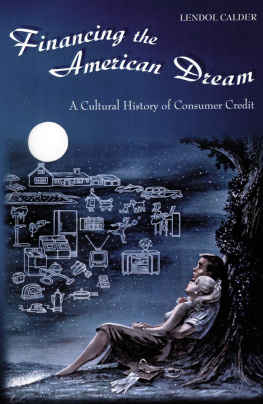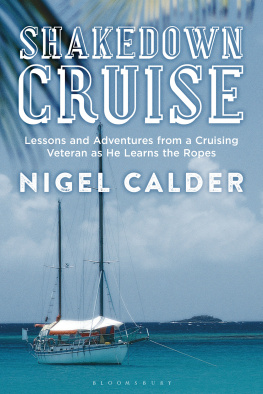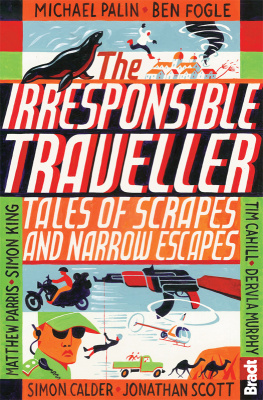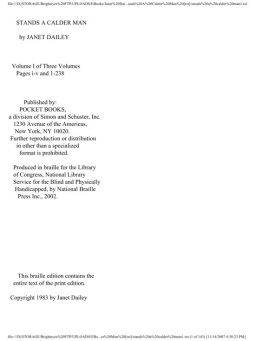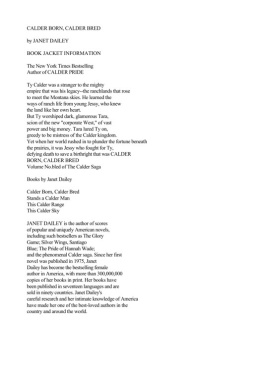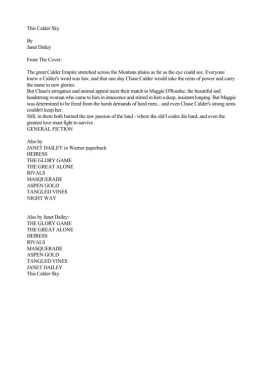Calder - A Hero for the Americas
Here you can read online Calder - A Hero for the Americas full text of the book (entire story) in english for free. Download pdf and epub, get meaning, cover and reviews about this ebook. year: 2017, publisher: University of Regina Press (eBOUND), genre: Romance novel. Description of the work, (preface) as well as reviews are available. Best literature library LitArk.com created for fans of good reading and offers a wide selection of genres:
Romance novel
Science fiction
Adventure
Detective
Science
History
Home and family
Prose
Art
Politics
Computer
Non-fiction
Religion
Business
Children
Humor
Choose a favorite category and find really read worthwhile books. Enjoy immersion in the world of imagination, feel the emotions of the characters or learn something new for yourself, make an fascinating discovery.
- Book:A Hero for the Americas
- Author:
- Publisher:University of Regina Press (eBOUND)
- Genre:
- Year:2017
- Rating:4 / 5
- Favourites:Add to favourites
- Your mark:
- 80
- 1
- 2
- 3
- 4
- 5
A Hero for the Americas: summary, description and annotation
We offer to read an annotation, description, summary or preface (depends on what the author of the book "A Hero for the Americas" wrote himself). If you haven't found the necessary information about the book — write in the comments, we will try to find it.
A Hero for the Americas — read online for free the complete book (whole text) full work
Below is the text of the book, divided by pages. System saving the place of the last page read, allows you to conveniently read the book "A Hero for the Americas" online for free, without having to search again every time where you left off. Put a bookmark, and you can go to the page where you finished reading at any time.
Font size:
Interval:
Bookmark:

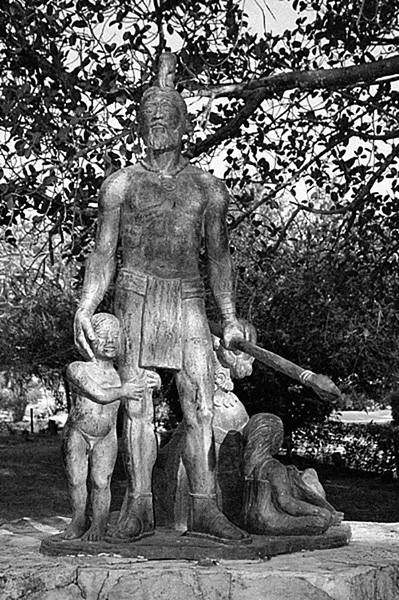
Statue of Gonzalo Guerrero by Raul Ayala Arellano, 1974 by Feliks, 2008 (original in colour). Used under a Creative Commons licence.
a
Hero
for the
Americas
The Legend of Gonzalo Guerrero
Robert Calder

2017 Robert Calder
All rights reserved. No part of this work covered by the copyrights hereon may be reproduced or used in any form or by any means graphic, electronic, or mechanical without the prior written permission of the publisher. Any request for photocopying, recording, taping or placement in information storage and retrieval systems of any sort shall be directed in writing to Access Copyright.
Printed and bound in Canada at Friesens. The text of this book is printed on % post-consumer recycled paper with earth-friendly vegetable-based inks.
Cover design: Duncan Campbell, University of Regina Press
Text design: John van der Woude, jvdw Designs
Copy editor: Dallas Harrison
Proofreader: Kristine Douaud
Indexer: Sergey Lobachev, Brookfield Indexing Services
Cover art: Detail of sculpture by Carlos Terrs. Allegory of mestizaje, 1981 , terroca and reinforced concrete, 35 x 19 m, City of Chetumal Quintana Roo. Used with permission.
Library and Archives Canada Cataloguing in Publication
Calder, Robert Lorin, 1941 -, author
A hero for the Americas : the legend of Gonzalo Guerrero / Robert Calder.
Includes bibliographical references and index. Issued in print and electronic formats. isbn - - 88977 - - (softcover). isbn - - 88977 - - ( pdf ). isbn - - 88977 - - ( html )
. Guerrero, Gonzalo, -approximately 1528 . . SpaniardsMexicoBiography.
. Shipwreck victimsMexicoBiography. . MayasMexicoHistory.
. MexicoHistoryConquest, - 1540 . . Yucatn PeninsulaHistory. i . Title.
f 1435 . c '. 02092 c 2017 - 5023 - c 2017 - 905024 -

University of Regina Press, University of Regina
Regina, Saskatchewan, Canada, s4s 0a2
tel: (306) 585-4758 fax: (306) 585-4699
web: www.uofrpress.ca
We acknowledge the support of the Canada Council for the Arts for our publishing program. We acknowledge the financial support of the Government of Canada. / Nous reconnaissons lappui financier du gouvernement du Canada. This publication was made possible with support from Creative Saskatchewans Creative Industries Production Grant Program.

For Holly


maps
Map . Spain
Map . The Caribbean
Map . The Yucatn Peninsula
introduction
A Haunting, Tantalizing Tale
chapter one
No White Man Ever Enters It: The Yucatn Peninsula
chapter two
To Serve God and... to Get Rich: The Lure of the New World
chapter three
It Seemed the End of the World: Balboa, Pizarro, and the Perils of Darin
chapter four
It Will Never Do to Leave Him Here: Shipwreck, Enslavement, and Hernn Corts
chapter five
What Would the Spanish Say Should They See Me in This Guise?:
Gonzalo Among the Maya
chapter six
Language Is the Perfect Instrument of Empire: Aguilar and the Conquest of the Aztecs
chapter seven
Gonzalo, My Brother and Special Friend: Guerrero the Warrior and the Battle for Yucatn
chapter eight
The Power of Narrative Is Absolute:
Guerrero in the Contemporary Mexican Consciousness
afterword
We Are a Mtis Civilization
Acknowledgements
Notes
Bibliography
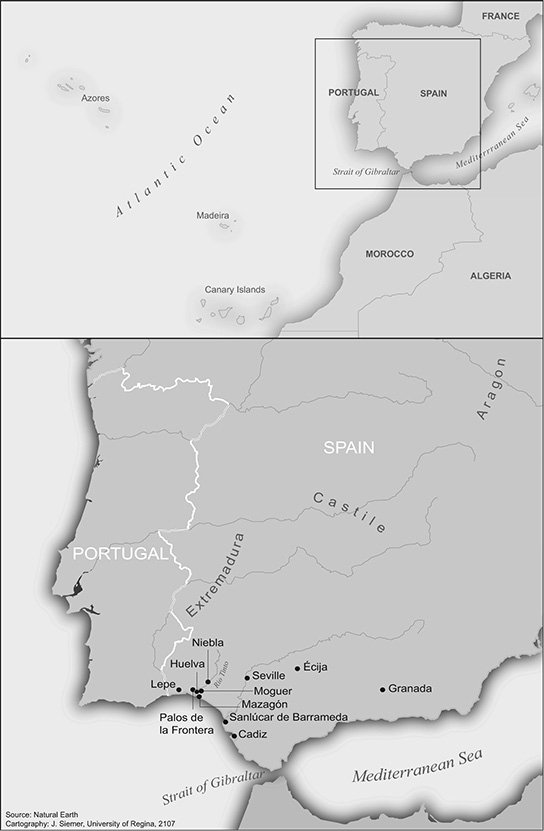
Map . Spain
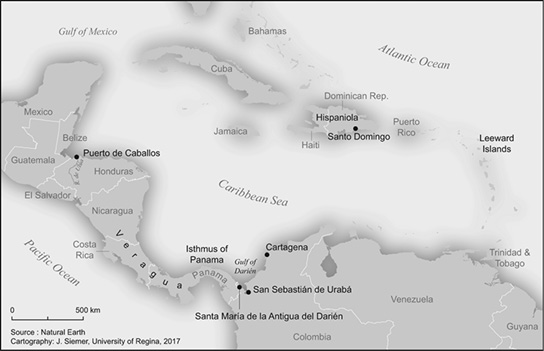
Map . The Caribbean

Map . The Yucatn Peninsula


I n January 1512 , a mere twenty years after Christopher Columbus first saw the New World, a party of Spanish men and women were shipwrecked while sailing from what is now Panama to Hispaniola (the island comprising Haiti and the Dominican Republic). About twenty survivors were blown onto the Yucatn Peninsula, the first Europeans to set foot on that soil, and they were soon captured by its inhabitants, the Maya. The castaways leaders, according to the common practice in Mesoamerica, were sacrificed to the Mayan gods, and all but two of the remaining party died from the effects of their days at sea and their subsequent enslavement.
The fate of this shipwrecked company remained a mystery to Spanish colonial officials until 1519 , when the conquistador Hernn Corts landed on Cozumel Island, off the Yucatn coast, at the beginning of his great trek into the heart of Mexico. Out of the jungle emerged a Spaniard, Jernimo de Aguilar, who spoke of his seven years of captivity in a Mayan tribe and of his great joy at being reunited with his countrymen. He also spoke of another Spaniard, whom he called Gonzalo, who likewise had learned of the presence of Spanish ships at Cozumel but had declined to join Aguilar in seeking them. Gonzalo, he said, had risen from slave to military captain in a Mayan tribe, had married the daughter of the chief, and had fathered three children. Moreover, he had adopted the native customs and beliefs so thoroughly that he could never again live among his own people.
Aguilar remained with Cortss company and, serving as one of the most famous translators in Mesoamerican history, became an essential part of the remarkable conquest of Montezumas Aztec Empire. As a reward for his services, he was given sizable tracts of land and numerous native tenants near Mexico City, and his name appears frequently in the historical accounts of sixteenth-century Spanish chroniclers. Aguilar left no memoirs or letters, though he submitted several petitions to the Spanish court near the end of his life, so his attitudes and motivations will never be fully understood.
Although something of his life in Yucatn and mainland Mexico is known, Gonzalo remains a mysterious figure. Like Aguilar, he gave no written account of his life, but unlike Aguilar he left no trace of himself in any civic or legal proceedings. He exists as a historical figure because of the testimony of Aguilar, the only Spaniard known to have seen him after the shipwreck; the subsequent accounts of chroniclers, notably Bernal Daz del Castillo, Gonzalo Fernndez de Oviedo, Francisco Lpez de Gmara, Fray Diego de Landa, and Francisco Cervantes de Salazar; and an intriguing letter to the Spanish government from a colonial official in Honduras in 1536 , a report of the body of a Spaniard found on a battlefield among the native dead.
Font size:
Interval:
Bookmark:
Similar books «A Hero for the Americas»
Look at similar books to A Hero for the Americas. We have selected literature similar in name and meaning in the hope of providing readers with more options to find new, interesting, not yet read works.
Discussion, reviews of the book A Hero for the Americas and just readers' own opinions. Leave your comments, write what you think about the work, its meaning or the main characters. Specify what exactly you liked and what you didn't like, and why you think so.

